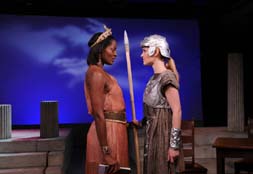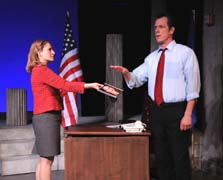
Dorothy Chansky
A Cinderella Story for the Mensa Set
"Hillary: A Modern Greek Tragedy With a (Somewhat) Happy Ending"
by Wendy Weiner
Directed by Julie Kramer
New Georges at the Living Theater
21 Clinton Street
New York, NY
Closed Saturday, December 20, 2008
Reviewed by Dorothy Chansky
Greek gods compel our interest for their all-too-human foibles, usually cloaked in chutzpah and personal magnetism. Powerful mortal leaders assume godlike stature with their nerve and charisma, brought back to earth by usually unplanned bouts of exposed human weakness. This pair of paradoxes drives Wendy Weiner's witty, wacky, and utterly winning "Hillary," a piece that deserves speedy publication and lots of university and community productions in the immediate future.
 |
| Victoire Charles (Aphrodite) and Heidi Armbruster (Athena) in “Hillary: A Modern Greek Tragedy With a (Somewhat) Happy Ending” . Photo by Jim Baldassare. |
Weiner's conceit is that the goddesses Aphrodite and Athena were best buddies until jealous Zeus pitted them against each other sometime a couple of millennia ago. (Count on an insecure guy to spread lies about girls saying their friends have fat thighs or didn't deserve legitimately won honors.) Fast-forward to the early1960s and a fourteen-year-old girl who dedicates herself to Athena in order to fight gender inequality—the kind that says only men can be astronauts or presidents and that makes the girl's dad scoff at her debate prize since she merely defended the value of poetry. The girl's mantra becomes "emotions are stupid and I am smart"; her name is Hillary Rodham. Athena is her patroness; Aphrodite, her nemesis. Sort of.
The fast-paced production at New Georges—arguably today's premiere American feminist theatre company—took full advantage of the interpenetration of past and present/legendary and factual embedded in the script. Director Julie Kramer found a tone for the four-person chorus that collapsed the boundaries between classical, wise-guy, and intimate. (How else to play opening lines like "Bolt the Doors/Close the curtains/Turn off your cell phones. . . In a time before Travelgate. . . .There was a pair even more famous than Hillary and Bill. . . . We know—it doesn't seem possible"?)
Where it all leads is, on the one hand, to a chronological story of Hillary's rise from Wellesley wunderkind to First Lady and U.S. senator. More importantly, it's an emotional and P.R. coming-of-age myth for both the heroine and the audience. Knowing the full truth doesn't always make things better (see Flowers, Lewinsky, et al. v. heart of Hillary Rodham Clinton) and embracing an enabling fiction really can put wind beneath your wings. (I have to assume the behind-closed-doors strategy sessions between Athena and Hillary took place in someone's imagination, even if it was the then-First Lady's.)
 |
| Mia Barron as Hillary Clinton and Darren Pettie as Bill Clinton, swears on his daughter Chelsea’s. Photo.Photo by Jim Baldassare. |
Kramer's cast all managed to be flexible, compelling, funny, and collaborative. Mia Barron's Hillary was really driven, and really in love. She made it seem reasonable, if regrettable, that having Athena take half her heart was the only way she could bear Bill's infidelities and lies. She also made it credibly touching that, despite winning a promise from Aphrodite to take the other half, in the end she wanted her feelings as much as her intellect. Darren Pettie created a Bill who did not so much channel the former President as thoroughly evoke his foibles, his smarts, and, yes, his sexiness. Heidi Armbruster (Athena) and Victoire Charles (Aphrodite) were a well-matched pair of willowy, wily powerhouses. Athena morphed into a law librarian who shushed Hillary when she was smooching with Bill instead of studying. Later, upset at Hillary's move to Arkansas and wanting to keep her protégée on task, Athena emerged in the guise of a gubernatorial intern more valuable to Bill for her bust than for her brain. Aphrodite, for her part, adopted the person of Gennifer Flowers in an attempt to beat out her rival.
 |
| Mia Barron as Hillary Clinton is holding Monica Lewinsky after having turned her into a stuffed cow. Photo by Jim Baldassare. |
Ultimately, both goddesses agree that what Hillary needs is a dose of the truth. If their reasons are opposite, though, Hillary manages to take and learn from each. In fact, she is willing to go to hell and back to get herself on the right track, and in the afterlife she is mentored by Eleanor Roosevelt—arguably the doyenne of turning the pain of a cheating presidential husband into the triumph of a life purposefully focused elsewhere. Jenny Mercein's performance as Eleanor was a sinewy counterpoint to her Valley Girl Monica Lewinsky.
The physical production was fun and functional—a good combination in a small space. Lauren Helpern's straightforward setting featured two stepped platforms with Doric columns of varying heights. Judicious use of projections allowed for lightning when various deities clashed. Subtle lighting and evocative but never overwhelming sound effects were the work of Graham Kindred, Jill BC Duboff, and Joshua Higgason. Amelia Dombroski's costumes leaned less on "authenticity" than on evoking moments of recognition, and they succeeded.
Liberal bona fides are not required to get a kick out of this play. Nor do you have to choose between Aphrodite (does it feel good) and Athena (is it critically smart) to be a devotee of Artistic Director Susan Bernfield and her consistent ability to spin the big F word (that would be feminism) with a host of less controversial sisters: funny, fluent, fanciful, and fresh, for starters.

| museums | NYTW mail | recordings | coupons | publications | classified |